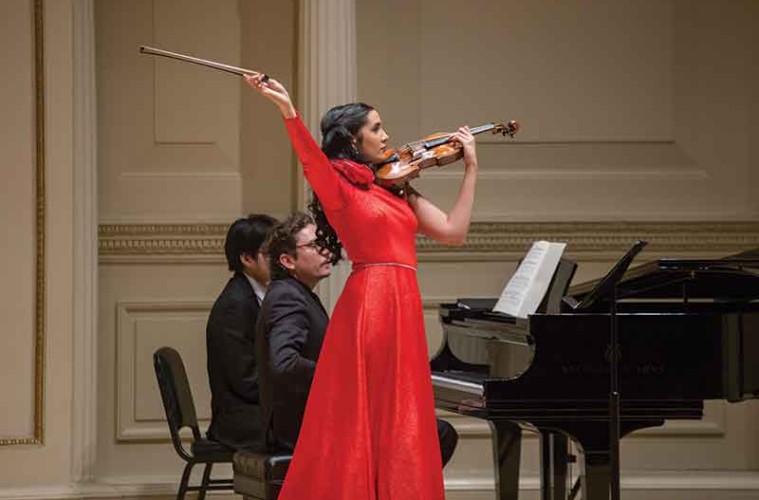String Magazine
Violinist Aisha Syed Debuts at Carnegie Hall
May 10, 2018
By Brian Wise

Aisha Syed-Castro, a violinist from the Dominican Republic who is now based in Miami, came to Weill Recital Hall on February 27 with a program that recognized her musical and cultural roots.
A native of Santiago, Syed-Castro (often shortened to Syed) moved to England at age 13 to study at the Yehudi Menuhin School and later at the Royal Conservatory of Music. The 28 year old now frequently tours throughout Latin America and, according to her bio, is a Goodwill Ambassador for the Dominican Republic. New York thus provided a natural focus, with its population of three quarters of a million Dominicans being the largest in the US.
The recital doubled as a benefit gala for the nonprofit Dominican Culture and Heritage Society and it also coincided with the Caribbean nation’s Independence Day. As Syed said in a phone interview before the recital, she chose works “that have accompanied me throughout my short career.” But while the first half drew on music with a Spanish flavor, the post-intermission pieces by Bach and Franck showed some of her most inspired, technically secure playing.
“Syed brought out the implied melodic threads, and foregrounded the narrative flow amid the thicket of double and triple stops.”
Indeed, possibly the least gala-friendly score of the night, the monumental Chaconne from Bach’s Partita No. 2 in D minor unfolded with particular assurance and structural clarity. Playing on a loaned 1690 “Stephens” Stradivari, Syed brought out the implied melodic threads, and foregrounded the narrative flow amid the thicket of double and triple stops. If her tone felt expansive for Bach, her unmannered reading was a reminder of how this score transcends age-old period vs. modern instrument debates.
With pianist Martin Labazevitch in sensitive support, Syed then presented a full-blooded reading of Franck’s Sonata in A major. Syed’s playing seems to flourish at the more robust end of the emotional spectrum, and if one sometimes hoped for more dynamic contrast and phrase shaping, her ample vibrato and sweeping bow strokes were wholly suited to this lushly perfumed work.
On tour, Syed has shown an affinity for Latin-American composers including Ginastera, Villa-Lobos, and Ponce, whose Violin Concerto she is currently learning. Perhaps one of those composers would have provided a more compelling contrast than the multiple salon pieces she presented. But the evening called for some old-school fireworks, and she began instead with “Danse espagnole,” a setting of music from Manuel de Falla’s opera La vida breve. Using Fritz Kreisler’s arrangement, Syed took the piece at a relaxed tempo and with a dollop of portamento.
Ravel’s Violin Sonata No. 2 and Sarasate’s Carmen Fantasy followed, both at times lacking a requisite crispness and definition. Indeed, the rubato gestures seemed to distort the jazzy pulse in Ravel’s “Blues,” and French delicacy was just out of reach. In the Sarasate, Carmen’s “Habanera” missed the steady insinuation of snapping castanets.
Possibly aware of time constraints, Syed never left the stage between pieces, and yet maintained an air of unflappable poise. She ended the program with a go-for-broke reading of Paganini’s La Campanella. Though not without a few blemishes, Syed gamely attacked its arsenal of spiccati, pizzicati, harmonics, trill-runs, and other techniques. An encore, “Por Amor” by Dominican composer Rafael Solano, was a lush, wholehearted tribute to her native country.
The evening ended as it began—with speeches. Local Dominican-American officials gave Syed a series of plaques and proclamations for her support of Dominican culture. On hand were State Senator Marisol Alcantara, New York City councilman Ydanis Rodriguez, and representatives of State Assembly member Carmen De La Rosa.
This article originally appeared in the June 2018 issue of Strings magazine.
